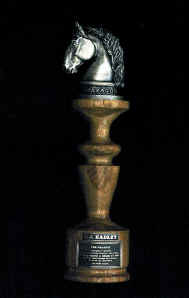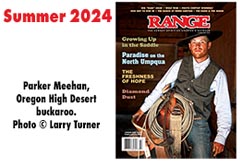|
Up Front
The
sheep shouldn‚t do
what?
By
C.J. Hadley
Fred
Fulstone called me last
spring. I had taken
three days off (first
time in months) and he
wanted me to come back
to Nevada early. „I
need you to go up in the
Sierra Nevada with me,
California Fish &
Game, and the U.S.
Forest Service. They
want to cut my permit,
throw me and my sheep
off the Dunderberg
Allotment. Their
fisheries biologists
want to explain why.š
I've got huge affection for Fred. I like old men and heâs 84, been working on the land his whole life. He was supposed to be a doctor like his mother, but his dad fell ill and he came back from college to help run the big sheep outfit based in Smith, Nev.
A dozen of us
gathered north of
Bridgeport in the early
morning. We had a few
rough miles to climb to
the allotment.
California Fish &
Game (CFG) didn‚t show
up; neither did the
fisheries biologist from
the Forest Service. The
experts in Lahontan
cutthroat trout, the
„endangeredš species
causing Fred and his
neighboring sheepmen
Paco and Miguel
Iturirria pain, were
supposed to explain why
their permit was cut by
a third and the sheep
had to go.
"They told me our sheep could drink from one short segment of Byday Creek,ä Fred says with amazement, ãand they could drink in the area only once."
The Iturirria
brothers‚ sheep could
use another short
segment of the same
creek, and only once.
The creek is eight miles
long, a foot wide,
unfenced, and, even by
unrealistic Forest
Service standards,
healthy. How do you keep
a few thousand sheep and
lambs from straying from
the narrow boundaries?
And why? Even though CFG
have planted Lahontan
cutthroat trout in the
lower end of Byday Creek
many times over the past
decade, none seem to
like living in it.
"Those fish are not here,ä Fred says. ãOur sheepherders have never seen any."
The ranchers have
also been thrown off
because of desert
bighorn sheep (see Tim
Findley‚s story, p.
56). Some bighorns were
transplanted to Lee
Vining Canyon by CFG to
use as reintroduced
herds for areas farther
south. State and federal
biologists, encouraged
by U.S. Fish &
Wildlife Service agents,
say they are traveling
toward Dunderberg and
want to make sure
Fulstone‚s domestic
sheep don‚t get in
their way.
"Weâve never seen any bighorns on our allotments either, because they have never been there,ä Fred says. ãVirginia Lakes Pack Station has been taking dudes into these mountains for a long, long time. They have never seen bighorns and havenât seen any sign. Why are they doing this to us?"
Of the three
women from the Forest
Service who did show up,
the wildlife biologist
was asked about the
Lahontan cutthroat
trout. „I don‚t know
anything about fish,š
she giggled.
Another Forest
Service bureaucrat
admitted she was there,
„to report on what‚s
said here.š Why? Were
they expecting a
backlash?
The young range
specialist admitted
she‚d only set foot on
the allotment twice.
Fred has been there
several times a year for
decadesųhis
sheepherders live up
there for monthsųand
it still looks good.
Maybe the
solution could be to
follow New Zealand‚s
example and throw out
most state and federal
agencies. The U.S.
Forest Service,
California Fish &
Game and the U.S. Fish
& Wildlife Service
should be first.
C.J.
Hadley is
editor/publisher of
RANGE magazine, which
she created in 1991.
|
The
Paladin Award
By
Al Schneberger,
Paragon Foundation
On
July 24, 2004, C.J.
Hadley,
publisher/editor
of RANGE received
the first annual
„Paladinš
award from Paragon
Foundation of
Alamagordo, N.M.
At the banquet
crowning a
four-day
conference of
Freedom 21, G.B.
Oliver, president
of Paragon,
honored CJ for her
15 years of
fighting for
ranchers‚
rights.
The Paladin
award is shaped
like a chess
piece, topped by
an exquisite solid
silver horse‚s
head on a
beautifully turned
hickory base.
The
sculptor is Wes
Smith of Nogal,
N.M. Wes
generously donated
his talent to the
project knowing
from the outset
the first
recipient would be
CJ. I think
you‚ll agree
that he hit a lick
in his
interpretation.
His western horse
(a cross between a
mustang and a
quarter horse)
goes way beyond
any stylized or
art deco chess
piece ever made
(see p.4). Wes
describes himself
as „just a New
Mexican cowboy.š
However, he is a
serious horse
trainer and
artist. He lives
on the slopes of
Sierra Blanca in
Lincoln County
with his wife
Cindy. They are
both well known in
cutting horse
circles.
The cowboy
who turned the
hickory base is
from a pioneer New
Mexico ranching
family. Joe
Switzer is from
Hondo, N.M. He is
ranch raised but
now makes cabinets
and does other
wood projects. Joe
also donated his
part of the
project with the
knowledge that the
first recipient
would be CJ.
The
citation is as
follows:
Life is toil. In this we are all manifest brothers and sisters. And while in the midst of our labors, it refreshes us to pause and celebrate the exceptional contributions of one of our own. We are not known so much by the honors we receive as the honors we bestow. So in selfishness we create this opportunity for ourselves. But it remains, that no matter how we attempt to explain our motives in this matter, the foundation of our opportunity lies in the unswerving dedication of one...
C. J. Hadley...
Her sustained effort through the years inspired the search for a fitting example to represent the spirit she has brought to bear in her life and labors. Paragon believes the example embodied in the paladins of yore most precisely illuminates her contributions.
The Paladin: A paragon of chivalry, a hero of sterling character and courage, a strong supporter or defender of a cause, one who rights wrongs and defends the weak and oppressed, the white knight.ä A paladin possesses the spirit of purpose, the dedication of labor, the oath of loyalty, the word of honor, the rock of friendship, the shield of honesty, and the sword of right.
|
|
|

Copyright
C. J. Hadley
(no
photo credit given)
The Paladin Award from Paragon Foundation. CJ said, It's for Tim Findley, for Barbara Wies, for J. Zane Walley and many others who have fought to keep RANGE ahead of the pack for the past 15 years.
|
|
|



